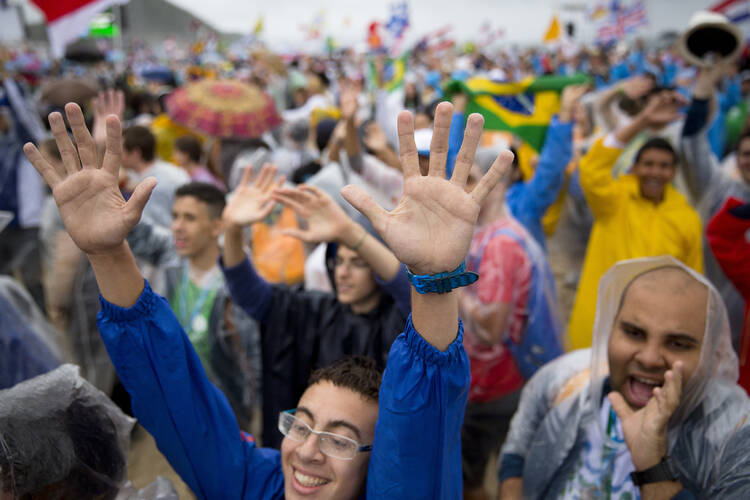Before the popes, both the Venerable Paul VI and the Blessed John Paul II, began to travel, it was possible to debate the pope’s popularity among the Latin American people. Distant, situated on another continent, object of insufficient catechesis that produced myths and religious prejudice, Catholics in Latin America did not seem to have strong ties to Rome. In the Americas, one could ask whether Peter’s successor was not simply an object of indifference.
The recent visit of Pope Francis to Rio de Janeiro to celebrate World Youth Day, where he was acclaimed by more than three million participants, offers a very different picture, one consistent with papal visits by Paul VI and Benedict XVI. Each one of the traveling popes had very different personalities, yet the people of Latin America have come out to welcome them with enthusiasm and admiration.
Paul VI’s trip to Colombia (1968), although quite brief, was the first papal visit to Latin America. The people put on their best clothes, filled the streets and the country stopped everything for four days. During John Paul II’s first trip to Mexico, the country came to a standstill, and the state-run TV had to cover every aspect of the visit. Possibly half of the people of Mexico saw and heard the pope directly. This required tiring walks on foot and, at times, all-night vigils. The papal trip from Mexico City to Puebla took three times as long as normal because the highway seemed to snake between two walls of human beings. Even in Monterrey, in the Northern desert, which is not a megalopolis, the pope gathered an estimated two million people.
The case of Mexico has been repeated with almost the same exact characteristics in each Latin American country the pope has visited. No other foreign visitor in history—no local politician since the day of independence, no sporting event, political concentration or national holiday of any kind—has achieved such power of convocation. Sociologists ask themselves why, just as do public relations experts and, above all, the political leaders in government. Even some theologians are perplexed. There have been cases (in Mexico, for instance) where political scientists and sociologists have called for a meeting with priests, in an effort to understand the phenomenon.
To attribute the pope’s popularity among the Latin American people to the Polish pope’s charisma is insufficient. With Paul VI the same thing occurred. There is little evidence for the argument that the people adhere to one pope over another, or that one pleases them more than another. Experience shows us that the Latin American people—everyday Christians—have little interest in evaluating their popes. That subject is left to the elite in Latin America, who also gather in the street to receive the current pope. It is a question of the pope’s popularity, simply because he is the pope.
How are we to respond to these perplexed sociologists and political scientists?
The answer is complex, involving several social and psychological factors, but the key factor is religious. The main cause of the experts’ perplexity is the forgotten fact of the power of the religious to convoke. Latin American people are more or less Christian, and all Christians are interested in meeting the pope, seeing such a meeting as something extraordinary, once in a lifetime, which they dare not miss. Add to this the characteristics of Latin American popular Catholicism, which is an expressive faith, happy to participate in community and multitudinous gatherings. It is a Catholicism of the tangible and the symbolic. And the pope is a living religious symbol of the first magnitude. A theologian would call it a symbol of the church’s unity, and of apostolic succession; the people see it in other terms. In their religious intuition, the pope is the “man of God,” God’s representative, a symbol of the religious and sacred. “To go see the pope” is sacramental; it is also in keeping with the itinerant tendency of their religious practice.
Other factors, of course, play a part. We should not dismiss the element of novelty and collective enthusiasm that is produced by the visits of Peter’s successors. But there are other, more profound, forces at work as well. The pope is a religious leader who speaks to the people not only of God, but also concerning their life and their human, social and even political problems. In the contemporary scene (especially in the Third World) where the public and political discourse has lost credibility, where demagoguery and popular manipulation are routine, and where corruption is notorious among the powerful, the presence and the word of the pope becomes a breath of fresh air that brings truth, authenticity and hope. It verifies the Gospel saying, “The sheep know their shepherd, and recognize his voice,” distinguishing the pope from false prophets and others who seek to take advantage of the flock.
In short, the multitudes that gather to see the pope (many of whom are poor, marginalized and oppressed) are indirectly protesting against their political and financial leaders, and are giving expression to a desire of liberty and dignity to which they aspire.
Do the people understand what the pope says? Not everything. But people are intuitive and understand with their heart. Their approach to the Holy Father is not so much a search for teaching as for religious inspiration and human freedom and, above all, a strong experience of God, the kind they cherish throughout their life, and which justifies the significant sacrifices involved.
Mario J. Paredes is the Roman Catholic liaison for the American Bible Society.








